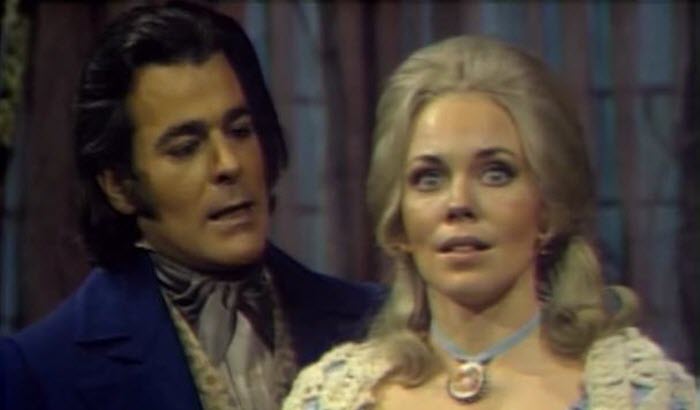
By PATRICK McCRAY
Taped on this date in 1971: Episode 1192
Samantha learns the terrifying secret of Joanna, but will it be enough to save her from becoming the next ghost of Widow’s Hill? Joanna Mills: Lee Beery. (Repeat. 30 min.)
After a startling imprisonment in Parallel Time, Quentin and Daphne escape to encounter Joanna Mills. After Samantha’s bullets pass through her, Joanna lures her onto Widow’s Hill, where she reveals herself to be a grotesque ghost, bent on revenge.
1840 continues to be the best-kept secret on Dark Shadows. It’s largely known for the surprising denouement of the Barnabas/Angelique storyline, and while the other arcs don’t have that kind of canonical weight, they can be tight, smart, and intriguing. Watching the Joanna Mills mystery conclude, we’re reminded of that. Like the beginning of the Leviathan story, 1840 seems to present both a main arc and an anthology running concurrently. In 1198, it wraps up a section of that anthology. The segment might be a challenge to get into (because of the ensemble of unfamiliar short-timers) but it pays off when you do. It’s one of those brief dimensions of the show like “The Stopping Off Place” story that ran a year before -- easily forgotten despite deserving of a mental dog-ear. I’m bending the page corner now.
If the episode has any message, it’s “don’t tick off a ghost.” Up until Joanna Mills, ghosts on the show reveled in their supernatural powers, and while they were incredibly powerful, there’s always the sense that they are limited to abilities like telekinesis and mind control. Joanna, though, successfully pulls off a hoax on a level that redefines what a ghost on the program can be. If Josette had possessed these powers, Angelique would have been the next unsuccessful cliff diver on Widow’s Hill. She’s intensely corporeal, fooling scads of people into believing she’s real and saving her big reveal for maximum impact. Actress Lee Beery brings a sense of placid control to the part, making her the perfect foil for the tightly wound, humorless Samantha as delivered by Virginia Vestoff. Her postmortem reveal is genuinely horrifying in a luridly Basil Gogos way, and in my book, that’s Louvreable. It’s another moment for parents of the age to have every reason to keep kids from watching, and even more reason for kids to go as Jim Phelps as possible to outwit household Standards & Practices. This kind of entertainment merits Ace bandage slings tied to bedframes, probably-lethally suspending kids upside down from the second floor, hovering like Spider-Man outside the family room where the forbidden images would spill forth.
1192 even gives a goose to Parallel Time when Quentin and Daphne are briefly trapped there, sucked back to Main Time only because two Kate Jacksons in one place created a Crisis of Infinite Daphnes. For a moment, the story has intrigue and suspense beyond the typical Parallel Time voyeurism. We even learn who discovered Parallel Time -- Ernest Weisman of the University of Vienna. It’s a great nugget of trivia from Quentin I, worthy of Eliot Stokes, and it ties the seemingly random events at Collinwood to a larger mythology that longs to be explored by future writers. It pays to keep watching -- back to the beginning of the show -- after wrapping up the “present” of 1841 PT. Taking the larger context of the Dark Shadows mythos with us, what we lose in mystery and wonder, we gain in intrigue and detail.
As an aside, Joanna Mills was of course, the reason that the song, “Joanna,” was written. It’s one of the lovelier, if “Airport loungey” pieces of music from the show, but because it appears so late in the series and in the less-popular of the MGM films, the piece remains obscure. Even more obscure are the lyrics, which I wrote last spring.
JOANNA
Music by Robert Cobert. Lyrics by Patrick McCray.
I’m wearing pants...
They’re made of Lycra.
And they cling tight to me in oh so many ways.
They’re just pants, you see,
But pants for me,
To wear for all my days.
When I think of all the leather lederhosen
That People wear in far off Germany…
When I think of how they chafe, I guess I am supposing,
They’re proud we see that they are firm of knee.
I’m wearing pants...
They’re made of Lycra
And they cling tight to me in oh so many ways.
They’re just pants, you see,
But pants for me,
To wear for all my days.
To wear for all my days.
This episode was broadcast Jan. 19, 1971.

